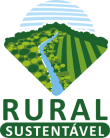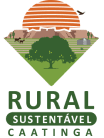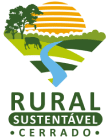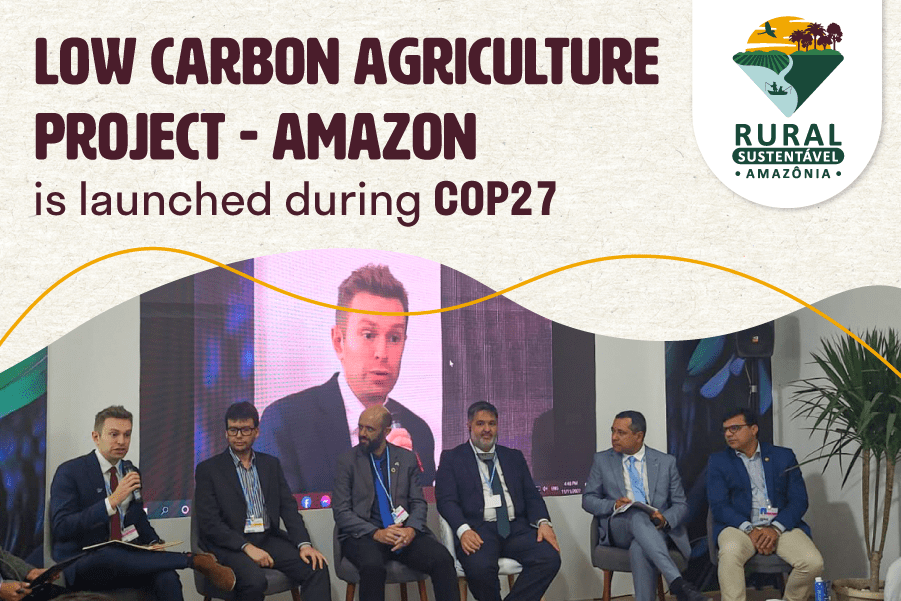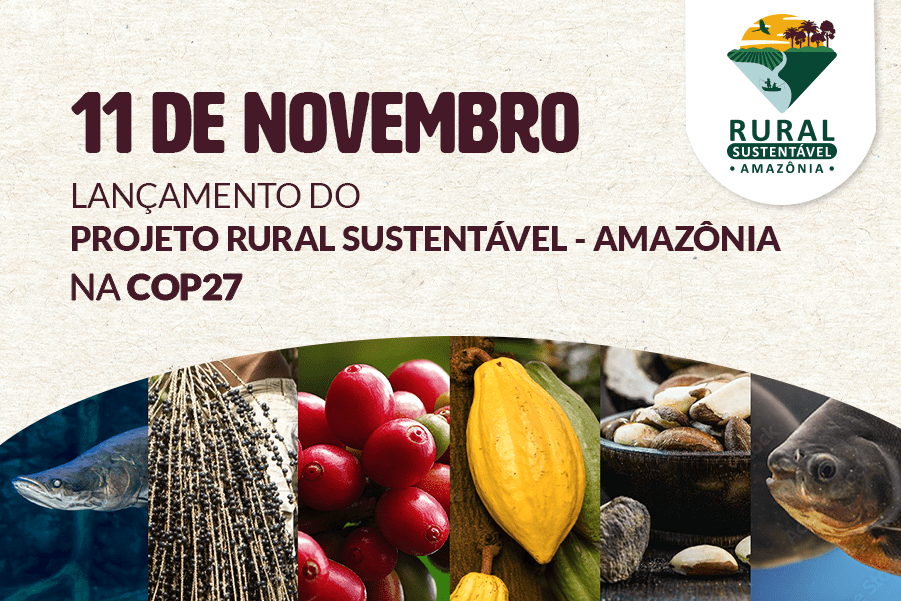ICF Low Carbon Agriculture Project - Amazon is launched during COP27
The event, on 11/11, brought together Brazilian and international authorities to present the Project that, in four years, seeks to leverage low-carbon agriculture in the biome.
Investments of around U$D 9 millions, six production chains strengthened in the states of Amazonas, Pará and Rondônia, 6,000 hectares of land managed in a sustainable way, 1,500 small producers and trained extractivists and/or sensitized, 15 socio-productive organizations strengthened and 600 families with adopted low-carbon agricultural practices. These are some of the goals that the Sustainable Rural Project – Amazônia proposes to achieve by 2025. Launched at the Legal Amazon Consortium Hub, on November 11, during the 27th United Nations Conference on Climate Change, COP27, Low Carbon Agriculture Project - Amazon (or PRS - Amazônia) is aimed at strengthening sustainable production chains, low-carbon agriculture, emissions reduction, livelihoods improvement and biome conservation.
For the secretary of Innovation, Sustainable Development and Irrigation from the Ministry of Agriculture, Livestock and Supply (MAPA), Cleber Soares, the project launched today is the operationalization of the ABC + Plan in the Amazon biome. “PRS-Amazônia is a project that aims to bring sustainable rural development to the Amazon region, promoting production chains that are increasingly sustainable and, consequently, decarbonizing. And, in a way, it also contributes to reducing the pressure for deforestation in the Amazon region, this biome that is so important for the whole world, not just for Brazil”, he evaluates. David Saddington, Head of Sustainable Supply Chains, from the UK International Forest Unit, highlighted the great impact that will be generated not only by the PRS - Amazônia, but by the entire Rural Sustentável Programme, with an increase in income of up to 25%. “Combined benefits from Phase I and II will support the planet until 2025, preventing deforestation, reducing greenhouse gas emissions and, of course, benefiting 35,000 people.” He added, highlighting that "this is the COP of implementation. And it is a fantastic sign of how finance is reaching final beneficiaries, who are also being involved in this sustainable transition". The speeches were followed by Esperanza Gonzales, a sector specialist at the Inter-American Development Bank (IDB), and Alejandro Muñoz, Director of Internationalization at the Brazilian Institute for Development and Sustainability, IABS, the institution responsible for implementing PRS – Amazônia on the ground.
Representatives from two of the states where the PRS - Amazônia will be present also participated, in addition to the Legal Amazon Consortium. The Secretary of State for Environmental Development of Rondônia, Marco Antonio Ribeiro de Menezes Lagos, stressed that low-carbon agriculture helps maintain food security. “It also has a role in respecting traditional production chains and improving new ones, so that they are sustainable, serving the population as a whole that will produce and consume this product”. The Secretary of State for the Environment and Sustainability of Pará, Mauro O’de Almeida, highlighted the PRS - Amazônia synergy with the others that already exist in the territory of Pará. Finally, Secretary Eduardo Tavares, representing the Legal Amazon Consortium, highlighted that “it is very good to be with all these partners today, seeing a real delivery. Real world implementation of low-carbon agriculture and a green economy in the Amazon is something concrete that is happening. PRS Amazônia brings a lot of synergy to what we do in the region!” he concluded.
The PRS - Amazônia is the result of the Technical Cooperation with the IDB, with funds from the UK International Climate Finance (ICF), MAPA as the institutional beneficiary and IABS as responsible for the execution of the Project.
Women, indigenous peoples and tradicional communities
Acai and cocoa in the State of Pará; Brazil nut and arapaima fish in the State of Amazonas; coffee and round fish in Rondônia: PRS – Amazônia will work in six prioritized production chains of Amazonian products, in three Brazilian states. The actions are aimed at strengthening these production chains, promoting Amazonian brands, inserting products into the market, providing technical assistance and rural extension, capacity building, in addition to strengthening groups of small producers and extractivists: the Socio-Productive Organizations (PSOs).
The supply chains will be worked in an integrated and interconnected way, being considered from the cultivation and/or extraction to their commercialization. PRS – Amazônia focuses on sustainable production systems and technologies that prioritize nature and the replacement of practices associated with deforestation, in addition to strengthening producer and extractive organizations to facilitate access to markets, information and services, demonstrating the value of biome protection and restoration. Actions involving PSOs will have a more specific look at organizations composed mostly of traditional communities, indigenous peoples and women.
The Project will also offer a list of capacity building actions, ranging from Distance Learning, through Field Days, on-site courses, social empowerment actions and Professional Master's: all specially designed for the characteristics of the Amazon and low-carbon-emission practices.
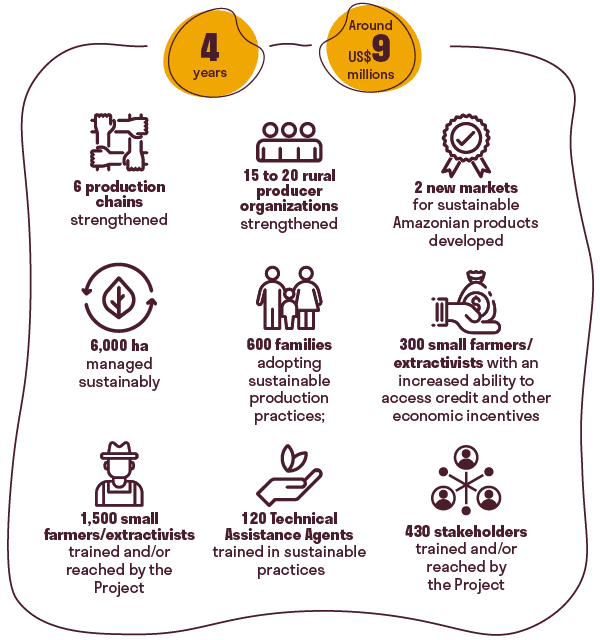
Find out more about PRS – Amazônia at: http://prsamazonia.org.br/ and follow the social networks: @prsamazonia
Project is the second in the Amazon biome
PRS – Amazônia is part of the Low Carbon Agriculture Programme (PRS), which has been operating in Brazil for more than a decade, and seeks to contribute to a sustainable transition in agriculture and livestock in Brazil's main biomes, based on the use of low carbon emission practices and social technologies, while avoiding illegal deforestation and pressure to expand new productive areas. In its first phase, PRS worked in the Amazon and Atlantic Forest until 2019 and benefited around 4,000 producers in 70 municipalities, with more than 46,000 hectares of land with avoided deforestation and degradation and more than 30,000 participants in capacity building actions.
In the current phase – the second – the Program returns to the Amazon biome, in addition to working in the Caatinga and Cerrado. With this intervention, considering the three biomes, the Programme is expected to increase the income of rural producers by up to 25%, through an increase of up to 10% in land productivity, a reduction of 29M tons of greenhouse gases from avoided deforestation, and more than 30 thousand people benefited. Altogether, around U$D 84 million are earmarked for low-carbon agriculture, with a presence in around 21% of Brazilian territory. For comparison purposes, this scope corresponds to the sum of the extension of countries such as Portugal, Spain, France, Italy, Switzerland, Greece and Belgium.
Projeto Rural Sustentável – Amazônia é lançado durante a COP27
Evento, em 11/11, reuniu autoridades brasileiras e internacionais para apresentar o Projeto que, em quatro anos, busca alavancar a agricultura de baixa emissão de carbono no bioma
Investimentos na ordem de R$ 50 milhões de reais, seis cadeias produtivas fortalecidas nos estados do Amazonas, Pará e Rondônia, 6.000 hectares de terra manejados de forma sustentável, 1.500 pequenos(as) produtores(as) e extrativistas capacitados(as) e/ou sensibilizados(as), 15 organizações socioprodutivas fortalecidas e com 600 famílias adotando práticas agrícolas de baixa emissão de carbono. Essas são algumas das metas que o Projeto Rural Sustentável – Amazônia se propõe a atingir até 2025. Lançado no Hub do Consórcio da Amazônia Legal, no dia 11 de novembro, durante a 27ª Conferência das Nações Unidas sobre Mudanças Climáticas, a COP27, o PRS - Amazônia é voltado ao fortalecimento de cadeias produtivas sustentáveis, à agricultura de baixa emissão de carbono e à conservação do bioma.
Para o secretário de Inovação, Desenvolvimento Sustentável e Irrigação do Mapa, Cleber Soares, o projeto lançado hoje é a operacionalização do Plano ABC + no bioma amazônico. “O PRS-Amazônia é um projeto que visa levar o desenvolvimento rural sustentável para a região amazônica, promovendo cadeias produtivas cada vez mais mais sustentáveis e, consequentemente, descarbonizantes. E, de certa forma, também contribui para reduzirmos a pressão pelo desmatamento na região amazônica, esse bioma tão importante para todo o mundo, não só para o Brasil”, avalia. David Saddington, Head of Sustainable Supply Chains, na International Forest Unit, do Governo do Reino Unido, destacou o grande impacto que será gerado não só pelo PRS - Amazônia, mas por todo o Programa Rural Sustentável, com aumento de renda de até 25%. “Benefícios combinados da Fase I e II vão apoiar o planeta até 2025, evitando o desmatamento, reduzindo as emissões de Gases de Efeito Estufa e, claro, beneficiando 35 mil pessoas”. E completou destacando que "essa é a COP da implementação. E é um sinal fantástico de como o recurso está chegando na ponta, nos produtores, que também estão sendo envolvidos nesta transição sustentável”. As falas foram seguidas por Esperanza Gonzales, especialista setorial do Banco Interamericano de Desenvolvimento (BID), e Alejandro Muñoz, Diretor de Internacionalização do Instituto Brasileiro de Desenvolvimento e Sustentabilidade, o IABS, instituição responsável pela execução do PRS - Amazônia.
Participaram também representantes de dois dos estados em que o PRS - Amazônia estará presente, além do Consórcio da Amazônia Legal. O Secretário de Estado de Desenvolvimento Ambiental de Rondônia, Marco Antonio Ribeiro de Menezes Lagos, ressaltou que a agricultura de baixo carbono ajuda a manter a segurança alimentar. “Também tem papel no respeito às cadeias produtivas tradicionais e na melhora de novas cadeias produtivas, para que sejam sustentáveis, servindo à população como um todo a que vai produzir e a que vai consumir esse produto”. Já o secretário de Estado de Meio Ambiente e Sustentabilidade do Pará, Mauro O’de Almeida, destacou que o PRS - Amazônia sinergia com as outras que já existem no território do Pará. Por fim, o Secretário Eduardo Tavares, representando o Consórcio da Amazônia Legal, destacou que “é muito bom estar com todos esses parceiros hoje, vendo uma entrega real. A migração para implantação de uma agricultura de baixo carbono e economia verde na Amazônia é algo concreto que está acontecendo. Tem muita sinergia!”, finalizou.
O PRS – Amazônia é resultado da Cooperação Técnica aprovada pelo BID, com recursos do Financiamento Internacional do Clima do Governo do Reino Unido, tendo o MAPA como beneficiário institucional e o IABS como responsável pela execução do Projeto.
Comunidades tradicionais, povos indígenas e mulheres
Açaí e cacau no estado do Pará; castanha-do-Brasil e pirarucu (de manejo) no Amazonas; café e peixes redondos em Rondônia: o Projeto Rural Sustentável – Amazônia atuará em seis cadeias produtivas priorizadas de produtos amazônicos, em três estados brasileiros. As ações são voltadas ao fortalecimento dessas cadeias produtivas, à promoção de marcas amazônicas, à inserção de mercado dos produtos, à assistência técnica e extensão rural, à capacitação, além do fortalecimento e nucleação executiva de ações a partir de coletivos de pequenos produtores(as) e extrativistas: as Organizações Socioprodutivas (OSPs).

As cadeias serão trabalhadas de forma integrada e interligada, sendo consideradas desde o cultivo e/ou extração até a sua comercialização. O PRS – Amazônia possui foco em sistemas e tecnologias de produção sustentáveis que priorizam a natureza e a substituição de práticas associadas ao desmatamento, além do fortalecimento das organizações de produtores(as) e extrativas para facilitar o acesso a mercados, informações e serviços, demonstrando o valor da proteção e restauração do bioma. As ações envolvendo as OSPs terão um olhar mais específico para as organizações compostas, em sua maioria, por comunidades tradicionais, povos indígenas e mulheres.
O Projeto também oferecerá um rol de ações formativas, que vão desde o Ensino a Distância, passando por Dias de Campo, cursos presenciais, ações de empoderamento social e Mestrado Profissional: tudo especialmente desenhado para as características da Amazônia e de práticas de baixa emissão de carbono.
Conheça mais sobre o PRS – Amazônia em: http://prsamazonia.org.br/ e acompanhe pelas redes socias: @prsamazonia
Projeto é o segundo no bioma amazônico
O PRS – Amazônia faz parte do Programa Rural Sustentável (PRS), que atua no Brasil há mais de uma década, e busca contribuir para uma transição sustentável na agricultura e pecuária dos principais biomas do Brasil, a partir do uso de práticas agrícolas de baixa emissão de carbono e de tecnologias sociais, ao passo que evita o desmatamento ilegal e a pressão pela expansão de novas áreas produtivas. Em sua primeira fase, o PRS atuou na Amazônia e na Mata Atlântica até 2019 e beneficiou cerca de 4 mil produtores(as) em 70 municípios, com mais de 46 mil hectares de terra com desmatamento e degradação evitados e mais de 30 mil participantes em ações de capacitação.
Na fase atual – a segunda –, o Programa retorna ao bioma amazônico, além de atuar na Caatinga e no Cerrado. Com essa atuação, considerando os três biomas, espera-se aumentar em até 25% a renda de produtores e produtoras rurais, por meio do aumento de até 10% da produtividade da terra, a redução de 29M tons de gases de efeito estufa por meio do desmatamento evitado, e mais de 30 mil pessoas beneficiadas. Ao todo, são cerca de 84 milhões de dólares destinados à agricultura de baixa emissão de carbono, com presença em cerca de 21% do território brasileiro. A fins de comparação, essa abrangência corresponde à soma da extensão de países como Portugal, Espanha, França, Itália, Suíça, Grécia e Bélgica.



